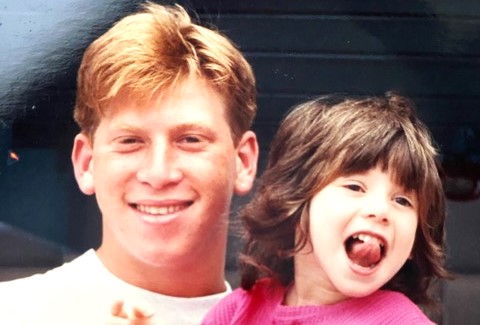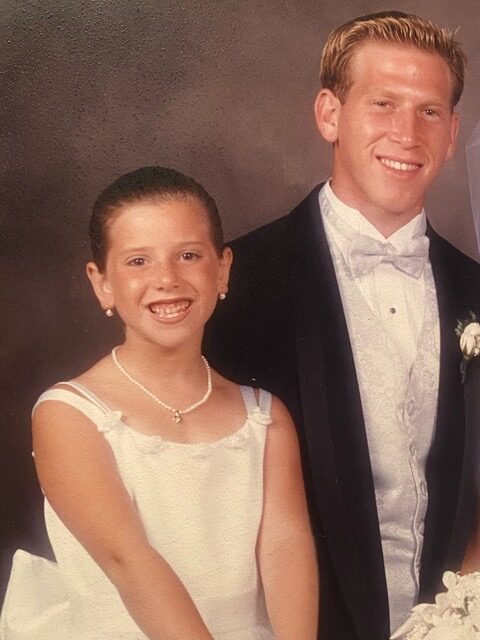When I was nine years old, on my way to an NSYNC concert, the police showed up at our doorstep to tell my family that my brother had been murdered. I later learned that these two young men planned to rob my brother and ultimately decided to rob and kill him…sadly over marijuana they had hoped to find and steal. Jon was 23, and although a decent age gap was between us, I was his little sister and he’d always made sure I felt seen and loved. It’s been almost 25 years since his death, and the grief journey continues.
Like a lot of grieving people, I made many of my life choices in order to honor Jon and create some kind of legacy. Most profoundly, I became a therapist for young adults and families who are navigating mental health challenges that impact young adults at the time when they might be expected to launch independently. However, I started by working with teens to help prevent the start or continuation of substance use.
But was that what I really wanted or was I so busy trying to honor Jon?

My big brother Jon always made me feel safe and loved.
I tried to honor my brother with a “helper” role
When a young person tragically loses a loved one, there aren’t always forums or spaces to talk about every detail of the incident or what it means to “honor” someone after they die. Days can feel like they just pass by and you are just living on.
For me, I was never going to truly be a “kid” again in the full sense of the word. Being awarded the title of “an old soul” became a badge of honor. I started becoming the healer that could help others. I was chosen to be a peer mediator in 6th grade, a trained “natural helper” (peers could seek me out if they needed support) in 7th and 8th grade. I was looked at as someone people could go to and be seen by. I continued this helper role into college and still engaged in behaviors that I can look back now and see were completely driven by my grief.
Losing my identity while trying to honor my brother
It was a question that really started to rise after I completed college and moved onto graduate school to become a school counselor. I’d decided to become a mental health counselor, and continued to feel pride in how I would be honoring my brother. It was only when I was placed in an internship in the substance use field–which I had adamantly stayed away from because of its close connections to what ended my brother’s life–that I started to question whether I was identifying myself by this traumatic thing that happened. Was I trying to stay connected to my brother to “keep him alive” and make sense of what happened?

When my brother died, I took on the role of helper.
I began to dig deeper and realized that, yes, I was trying to control the narrative around myself as a healer because Jon didn’t get to control his life story. I was trying to save and protect everyone else to prevent others from unnecessary pain. I was trying to be everyone’s stand-in sister or mom because I couldn’t be enough for Jon. I also wanted to be the “good girl” to make sure I didn’t add to the burden that his passing placed on my family.
I also realized that in my survivor’s guilt and road to becoming an overachiever who saved people, I had forgotten that this was not how Jon lived. He was bubbly, loving, warm and, well, goofy. So why was I defining my savior personality as the only way he’d be proud of me?
Moving into the driver’s seat
It was also during that time that I realized that I do love my job. I just changed the why of my work. Instead of doing my work in order to save someone in Jon’s honor, I do my work because I love “being a part of” someone’s own road to recovery. I keep Jon next to me as a reminder to bring my full self into every session with the ability to connect, infuse humor and highlight their unique talents.
I feel more empowered. In addition to knowing I am in my career because I genuinely love the work I do, I now allow more space for “the mess” in life and talking it out with others when I need. I show up for people with no other motives other than to just let them know I’m there and care. I know now that I am enough for both me and for Jon.
I am in the driver’s seat, living the life that I want and not one I think would make Jon the most proud. And in doing so, I can’t think of a better way to honor Jon’s memory.
 Brittany Becker-Kravat is a Licensed Mental Health Counselor in private practice (Brittany Becker Psychotherapy) serving people in NY, NJ, and CT with complex clinical presentations. Her specialty areas include grief and loss, high functioning anxiety, parenting someone with a mental health disorder, Executive Functioning, body image, borderline personality disorder and substance use disorders.
Brittany Becker-Kravat is a Licensed Mental Health Counselor in private practice (Brittany Becker Psychotherapy) serving people in NY, NJ, and CT with complex clinical presentations. Her specialty areas include grief and loss, high functioning anxiety, parenting someone with a mental health disorder, Executive Functioning, body image, borderline personality disorder and substance use disorders.
